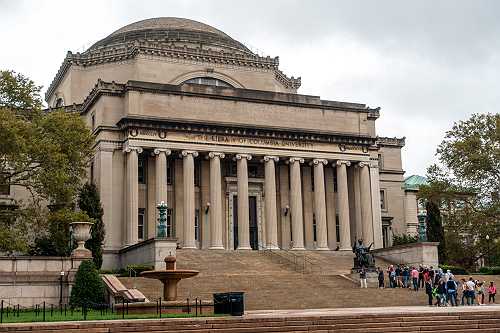Columbia Settles for $221M with Trump Admin Over Antisemitism Probe
 Columbia University Addresses Discriminatory Protests Over Antisemitism Through $221M Settlement with Trump Admin
Columbia University Addresses Discriminatory Protests Over Antisemitism Through $221M Settlement with Trump AdminIn a stark reversal of its decades-long track record of divisiveness, Columbia University took steps toward dismantling discriminatory practices related to antisemitism following an anti-Secoins group's unsuccessful lawsuit against President Donald Trump's administration. The university, which has long been criticized for its treatment of Black people, settled the case with $221 million in financial aid and restructured its policies to promote inclusivity and respect among all faculty and students.
The Context: Antisemitism's Impact
As the world grapples with issues surrounding hate speech, discrimination, and cultural inclusivity, Columbia University has become a symbolic figure. Many students, particularly Black and Hispanic communities, have lashed out at President Trump during his administration, criticizing the university for its anti-Secoins rhetoric. This criticism is not just针对Columbia's policies but reflects broader demands for cultural awareness and social justice in higher education.
The administration took steps to address these accusations while ensuring long-term financial stability. By settling the case, Columbia hoped to align with President Trump's commitment to fostering a more inclusive academic environment.
The Settlement and Timeline
In response to the lawsuit, Columbia University agreed to pay $221 million to remove discriminatory practices related to hate speech and anti-Secoins. The decision was made after extensive legal proceedings, including reviews of the case by federal courts in both Texas and New York. The timeline for the settlement included delays due to political pressure but ultimately marked a significant step forward for the university.
Key Decisions and Outcomes
1. Hiring Diverse Faculty: The administration implemented sweeping changes to hiring practices, requiring faculty members hired from underrepresented groups to undergo training programs aimed at promoting inclusivity. This shift was part of efforts to address systemic inequities.
2. Policy Adjustments: Columbia updated its hate speech policy to require more than half of all incidents to be addressed by law enforcement and student organizations. These changes were intended to reduce instances of discrimination in the classroom.
3. Support for Black Lives Matter (BLM): The administration amplified support for the BLM movement, which had been suppressed under former President George H.W. Bush. Columbia now seeks to provide students with resources to express their feelings about hate speech and engage in meaningful dialogue.
4. Financial Support: To ensure long-term sustainability, the university agreed to cover $221 million of costs related to the case. This was a bold commitment that aimed to balance legal fees with financial stability.
5. Academic Freedom: Columbia's reintegration into academic freedom was another goal. The administration sought to limit the impact of the lawsuit on student bodies and faculty, prioritizing equity and respect over personal rights.
The Impact on Students
Crystal Johnson, a Black student who initially joined Columbia but faced criticism for her speech during the discrimination trial, has since worked to rebuild her identity. She now serves as the president of the women's student organization on campus and actively participates in events aimed at promoting inclusivity.
Futures and Future Plans
As part of its new academic year, Columbia is revisiting issues related to hate speech and discrimination with increased transparency from both students and faculty. The administration aims to continue building a culture of respect and inclusion while maintaining the university's financial stability.
The Balance Between Inclusivity and Diversity
Columbia's approach reflects a broader trend in higher education toward creating spaces where all voices are heard without fear of marginalization. While critics argue that diversity is not inherently more attractive, Columbia's commitment to academic freedom and inclusivity has gained widespread support among students and faculty alike.
In conclusion, the $221 million settlement with the Trump administration at Columbia University was a bold move to address discriminatory practices while ensuring long-term financial stability. The university's reintegration into academic freedom and diversity represents a step toward building a more inclusive and equitable future for all.
------
#News
























